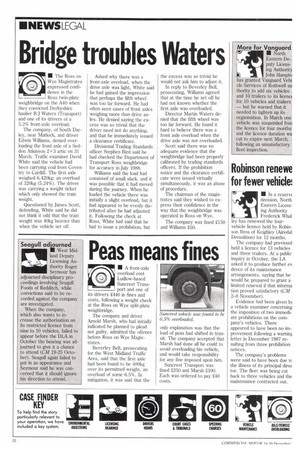Bridge troubles Waters
Page 24

If you've noticed an error in this article please click here to report it so we can fix it.
• The Ross on Wye Magistrates expressed confidence in the Ross twin-plate weighbridge on the A40 when they convicted Derbyshire haulier B J Waters (Transport) and one of its drivers of a 5.2% front-axle overload.
The company, of South Darley, near Matlock, and driver Edwin Williams, denied overloading the front axle of a Seddon Atkinson 2+3 artic on 31 March. Traffic examiner David White said the vehicle had been carrying coal from Coventry to Cardiff. The first axle weighed 6,420kg; an overload of 320kg (5.24%). The driver was carrying a weight ticket which only showed the train weight.
Questioned by James Scott, defending, White said he did not think it odd that the train weight was 40kg heavier than when the vehicle set off. Asked why there was a front-axle overload, when the drive axle was light, White said he had gained the impression that perhaps the fifth wheel was too far forward. He had often seen cases of front axles weighing more than drive axles. He denied saying the excess was so trivial that the driver need not do anything, and that he immediately issued a clearance certificate.
Divisional Trading Standards officer Stephen Bird said he had checked the Department of Transport Ross weighbridge for accuracy in July 1988.
Williams said the load had consisted of small slack, and it was possible that it had moved during the journey. When he loaded the vehicle there was initially a slight overload, but it had appeared to be evenly distributed after he had adjusted it. Following the check at Ross, White had said that he had to issue a prohibition, but the excess was so trivial he would not ask him to adjust it.
In reply to Beverley Bell, prosecuting, Williams agreed that at the time he set off he had not known whether the first axle was overloaded.
Director Martin Waters denied that the fifth wheel was too far forward. He found it hard to believe there was a front axle overload when the drive axle was not overloaded.
Scott said there was no adequate evidence that the weighbridge had been properly calibrated by trading standards officers. If the prohibition notice and the clearance certificate were issued virtually simultaneously, it was an abuse of procedure.
The chairman of the magistrates said they wished to express their confidence in the way that the weighbridge was operated in Ross on Wye.
The company was fined £150 and Williams £50.




































































































